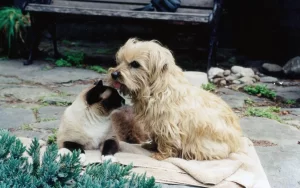When I called my mother on the phone one early November afternoon, her voice was weary.
She’d picked up one of her cats, Isis, from the vet with bad news. The green-eyed tabby of unknown age had developed a tumor in her mouth that was inoperable. She had only a short time left before she would no longer be able to eat or drink.

Lulu and a friend | Credit: Courtesy of Hope Green
My family home has always had at least a couple feline residents. But Isis was unique. She moved in six years ago after my mother’s best friend and my godmother, Jenny, suffered a major stroke. For us, as for many people who take in pets from their loved ones, Isis was a living, eating, purring connection to our dear friend. As we processed losing this peculiar little cat, we also resurfaced feelings of grief and loss for Jenny.
Jenny was part of our family. We celebrated holidays together, went on vacation together, stayed up late telling stories and laughing. A lifelong animal lover, she always kept a house full of doting cats and dogs. So when she was hospitalized after a severe stroke in May 2017, one of my mother’s first concerns was Jenny’s pets.
“The thing that I could do immediately, besides coming down and giving her a hug, was to figure out how to care for the cats,” my mother, Mary, says.
Please CLICK HERE to continue reading.



